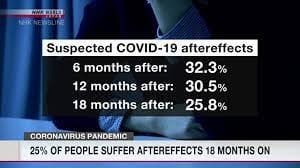
A Japanese research institute says one in four people continue to experience suspected coronavirus aftereffects even 18 months after infection.
The National Center for Global Health and Medicine interviewed 500 people who were infected between February 2020 and November 2021.
The center's survey found that about 32 percent complained of possible aftereffects six months after infection. The figure remained at about 26 percent even after 18 months.
The survey revealed that nearly 12 percent suffered memory loss, while 11 percent cited lack of concentration a year after infection
Ten percent said they experienced problems with their sense of smell.
(Morioka Shinichiro / Doctor, The National Center for Global Health and Medicine)
“We found that a certain number of people who had experienced only mild symptoms during infection still suffered aftereffects.”
The doctor urges people to continue anti-infection measures.
The National Center for Global Health and Medicine interviewed 500 people who were infected between February 2020 and November 2021.
The center's survey found that about 32 percent complained of possible aftereffects six months after infection. The figure remained at about 26 percent even after 18 months.
The survey revealed that nearly 12 percent suffered memory loss, while 11 percent cited lack of concentration a year after infection
Ten percent said they experienced problems with their sense of smell.
(Morioka Shinichiro / Doctor, The National Center for Global Health and Medicine)
“We found that a certain number of people who had experienced only mild symptoms during infection still suffered aftereffects.”
The doctor urges people to continue anti-infection measures.
◆aftereffect 後遺症 ta bad effect that continues for a long time after the thing that caused it
◆memory loss 記憶障害、物忘れ to say or think that someone or something is responsible for something bad









